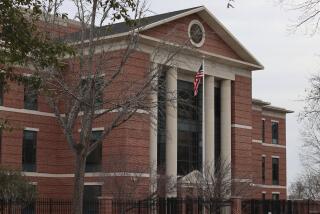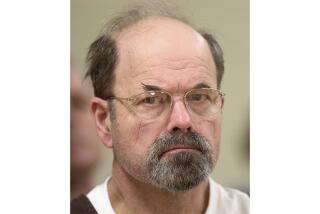Prosecutors detail defendant’s movements before antiabortion slaying
- Share via
Reporting from Wichita, Kan. — Prosecutors on Tuesday methodically reconstructed Scott Roeder’s movements in the days leading up to the killing of Dr. George Tiller, including three visits to a gun shop to purchase a handgun, a visit to a second gun shop to purchase new ammunition when the gun didn’t fire properly, and a morning of target practice the day before the shooting.
Tiller, one of the few doctors in the U.S. who performed late-term abortions, was killed with a .22-caliber bullet, shot point-blank into his forehead as he worked as an usher in the foyer of his church on May 31. For years, his clinic and his church were the sites of antiabortion protests.
Roeder, 51, who has admitted to killing Tiller, is on trial for first-degree murder. Prosecutors said they expected to rest their case against him today.
Thirteen prosecution witnesses testified Tuesday. They included law enforcement officials who found an empty gun box as they searched Roeder’s Kansas City home hours after the killing, and later discovered spent .22 casings in the yard of Roeder’s brother David. The brother had called the FBI to report that he feared his own handprints were on the gun used to kill Tiller.
The Roeders had tested Scott Roeder’s new gun on David Roeder’s remote wooded property near Topeka the day before Tiller was killed. The gun has never been found, and David Roeder has not been implicated in the case.
Jurors also saw several security camera video clips showing Roeder shopping for and buying a gun, checking out of his motel, and getting arrested on Interstate 35 about three hours after the killing.
About 10:40 a.m. that day, Johnson County Sheriff’s Deputy Andrew Lento was patrolling a rural area when he heard an alert to be on the lookout for a light-blue Ford Taurus with an older white male driver and a vanity Kansas State University front license plate.
Tiller had just been slain at church, and as the shooter fled, witnesses got his car’s license plate number. Within minutes, police had identified the vehicle’s owner as Roeder.
Lento told jurors he figured that if the suspect was heading in his direction, it would take him about three hours to get there on Interstate 35. So about 1:15 p.m., Lento said, he positioned his patrol car on a median on the interstate and waited. Within minutes, he spotted the fleeing car. He recognized it by the vanity plate -- a silhouette of a Kansas State University Wildcat.
Lento said that he called for assistance and followed Roeder for nearly five miles before three other police cars joined him. At that point, Lento testified, he turned on the video camera in his car and pulled Roeder over.
Watching the video, jurors heard Lento bark a series of orders at Roeder -- “Driver! Raise your hands! Raise both hands. . . . With your left hand, take the keys out of the ignition! Drop the keys!”
Lento ordered Roeder, facing forward, to walk backward, then to drop to his knees, whereupon officers moved in and handcuffed the suspect.
On Monday, a witness who had chased Roeder as he fled Reformation Lutheran Church said that he had flung his cup of coffee at Roeder as he drove away. On Tuesday, Wichita police crime scene investigator Andrew Maul showed photos of Roeder’s 1993 Taurus with light-brown spatters that appeared to be coffee.
Maul said that he found bullets and bullet casings on the floor of the car that were the same size and brand as the .22 bullet casing found next to Tiller’s body. He said that he also found a 10-inch dagger, which he described as “a nasty-looking serrated sheaf-type knife,” under the front seat.
The trial has continued to attract high-profile parties on both sides of the abortion debate.
“We are here to see justice done,” said Katherine Spillar of the Feminist Majority Foundation, which has worked to provide security for abortion providers since the late 1980s.
Spillar and other supporters of abortion rights are particularly concerned because Sedgwick County District Judge Warren Wilbert has not ruled out the possibility that the defense can argue that the crime was voluntary manslaughter, based on Roeder’s belief that he was saving the unborn by killing an abortion doctor.
On Tuesday, Randall Terry, once a leading figure in the fight against abortion, arrived in Wichita from Washington, D.C. Terry, who was not in the courtroom Tuesday, said that he would neither condemn nor condone Roeder’s actions, but has attacked Wilbert for allowing attorneys to question potential jurors about their religious practices and whether they had any religious beliefs that could affect their ability to be impartial.
More to Read
Sign up for Essential California
The most important California stories and recommendations in your inbox every morning.
You may occasionally receive promotional content from the Los Angeles Times.













